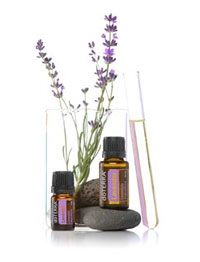 By KRISTI BEGUIN
By KRISTI BEGUIN Pregnancy is a joyous and exciting time in a woman’s life.
During pregnancy, women may experience a variety of conditions and discomforts that can be effectively treated with botanical remedies. Safety is usually the number-one concern of women when it comes to choosing any remedy, whether an over-the-counter medicine for heartburn or an herbal cough remedy during a cold.
There are many botanical remedies that are both safe and effective during pregnancy, and which can bring significant relief for a number of conditions and issues. Types of botanical remedies presented in this article include aromatherapy and herbal teas.
AROMATHERAPY
Essential oils are a lovely way to incorporate botanicals into your pregnancy and your lifestyle. When choosing essential oils, only pure, high quality essential oils are recommended. Look for essential oils that are therapeutic grade, pure oil distillates. Some commercial oil blends contain synthetic fragrances, which are added to reduce the cost and should be avoided. Recommended brands include doTERRA, Mountain Rose and Stillpoint Aromatics.
Essential oils can provide comfort and relief for many kinds of issues that can arise during pregnancy, such as muscle and joint aches, anxiety, colds, and swollen ankles. Pure, high-quality essential oils that are diluted and applied externally and used in moderation are generally considered safe to use throughout pregnancy.
Some oils are simply best avoided during pregnancy, such as calamus, cinnamon bark, mugwort, tansy and pennyroyal. These oils can thin the blood, and can cause cramping or uterine contractions.
When considering aromatherapy, you will want to have a carrier oil on hand to create dilutions. The general recommendation is 1 to 2 drops of essential oil to 1 tsp (5 ml) of carrier oil such as sweet almond, coconut oil, grapeseed, sesame, or jojoba, most which can be purchased from natural grocery stores or herb stores. A diffuser is another wonderful way to experience the benefits of aromatherapy. Several drops of diluted essential oils are placed in the diffuser, which slowly releases the aroma into the air.
Another easy way to benefit from aromatherapy is to add 2 to 4 drops of essential oils to bathwater. Refreshing and uplifting mists can be made by combining several drops of essential oil with distilled water and placing in an 8 to 12 oz. spray bottle.
The following essential oils have a long history of use for aromatherapy during pregnancy:
- Bergamot helps to alleviate muscle spasm, muscle aches, emotional upset, cold sores and helps to reduce fevers.
- Geranium is useful for soothing skin, hemorrhoids, varicose veins, nausea, emotional upset and acne.
- Ginger alleviates nausea, heartburn, muscle pain, combats colds and helps to improve appetite.
- Lavender eases anxiety and headache, muscle tension, muscle aches, helps with breast tenderness, skin irritations, helps induce sleep, eases allergy symptoms and can prevent early labor.
- Lemon assists with mental clarity and concentration (I.e., helps with Pregnancy Brain!); alleviates congestion, heartburn, nausea, constipation, acid-reflux and varicose veins; can be used for household cleaning.
- Sandalwood encourages deep sleep, soothes muscle spasms and cramping, and helps reduce tension and is deeply calming.
- Wild Orange is useful for anxiety, anger, nausea, insomnia, fatigue, acid reflux, heartburn and constipation.
- Ylang Ylang helps prevent or ease depression, frustration and insomnia, and helps reduce blood pressure and prevent preeclampsia.
Essential Oils. Courtesy photo
Specific conditions that can benefit from aromatherapy include:
Morning Sickness:Ginger or peppermint. Dilute and apply 1–3 drops on ears, down jaw bone, and on the feet. Place 1–3 drops of ginger in empty capsule with 1–3 drops of olive oil; swallow capsule. Diffuse into the air, inhale directly from bottle, or apply oil to hands, tissue, or cotton ball, and inhale.
Anxiety/Tension:Lavender, ylang ylang, melissa, or myrrh. Diffuse the diluted oil, or dilute the oil and rub it on back of neck, temples, chest, shoulders, back, or the feet.
High Blood Pressure:Ylang ylang, eucalyptus, lavender, clove, clary sage, or lemon. Diffuse or dilute as recommended, and apply to feet and hands, and over the heart. (Note: Avoid rosemary, thyme, and possibly peppermint.) Bath: Place 3 drops ylang ylang in bathwater, and bathe in the evening twice a week. Blend: Combine 5 drops geranium, 8 drops lemongrass, and 3 drops lavender in 1 oz. carrier oil. Rub over heart and on the left foot and hand.
Muscle Aches and Tension: Dilute lavender, bergamot, ginger, or sandalwood and apply to lower back, hips, shoulders, neck, and feet.
HERBAL TEAS AND INFUSIONS
Herbal teas offer a delicious and relaxing way to incorporate the nutritive and healing benefits of medicinal herbs into the day. During pregnancy, herbal teas can be used to assist relaxation, decrease stress, tone the uterine muscles, ease symptoms of seasonal allergies and relieve cold and flu symptoms. Herbs that ease the mind, decrease stress or anxiety, nourish the nerve tissues and relax muscles include the category of herbs called nervines. Chamomile, skullcap, hops, milky oats and passionflower are all considered safe during pregnancy, and can provide much-needed and welcome relief to a pregnant body and mind.
Raspberry Leaf tea has long been used as a female tonic, and is recommended during the last trimester of pregnancy. Raspberry leaf is astringent, and helps to tone and strengthen the uterine muscles.
Many herbs are rich in minerals and nutrients, and are useful in providing added nutritional support during pregnancy. Nettles, alfalfa, and horsetail are all considered to be high in minerals and mineral salts, which nourish and enhance the electrolytic activities of the body at the cellular level. Nettles contain more protein than any other native plant and contain large amounts of iron, trace minerals, fatty acids and chlorophyll. Nettles are known to help reduce the symptoms of seasonal allergies, helping to open the bronchial passages thus alleviating shortness of breath, wheezing and acting as an expectorant. Nettles have also been used to treat postpartum hemorrhage as well as to increase lactation. Interestingly, it is also useful to decrease the milk supply during weaning.
Some of my favorite ways to enjoy herbal teas during the summer is to make tea blends that can be enjoyed over ice with added lime or lemon wedges for flavor. A combination of Lemon Balm, nettles, and peppermint is one delicious blend. Combining raspberry leaf, alfalfa, peppermint and nettles creates a richly nutritive blend. Combine 3 Tbsp. of each crushed, dried herb together and place in a ½ gallon bottle. Pour boiling water over the herbs and steep for 20 minutes. Strain and enjoy. Alternatively, the herbs can be combined in mesh or cheesecloth and prepared as a sun tea—combine the herbs, add the water and let steep in the sun for a couple hours. Strain, if necessary.
During colds and flus, herbal teas can be used to relieve congestion, decrease fever and relieve muscle pains and aches. Mullein can be used safely during pregnancy for bronchitis, and is especially useful at the first sign of a hot, dry, painful cough. Many of the mints (i.e., peppermint, spearmint, wintergreen, or catnip) are used to decrease fevers by opening the pores and stimulating sweating. Lemon Balm also helps to decrease fevers and is anti-viral. Garlic is strongly antimicrobial, and if tolerated taste-wise during pregnancy, can be combined with lemon, a few ginger slices and honey if desired, to help combat illness at the onset of cold or flu symptoms.
These are just a few of the ways that botanicals can be used to help enhance the wonder and joy of pregnancy, and to safely alleviate the unpleasant issues that can arise during these 9-months of change and growth. Using herbs, foods and other holistic therapies can help you to stretch your intuitive skills, enabling you to discern and evaluate your symptoms and issues, and expand your personal healing skills.
Kristi Beguin is a clinical herbalist, birth doula, and ecologist. She specializes in women’s and family wellness, and offers a variety of wellness classes, personal development programs, and health consultations. Visit www.kristibeguin.comto learn more about her individual and group programs and services.

